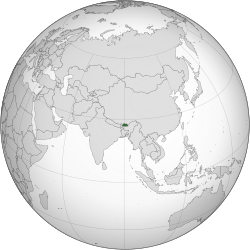بھوٹان
Appearance
Kingdom of Bhutan | |
|---|---|
 | |
| راز دٲنؠ and largest city | Thimphu 27°28.0′N 89°38.5′E / 27.4667°N 89.6417°E |
| سَرکٲرؠ زَبان | Dzongkha |
| مَذہب | |
| Demonym(s) | Bhutanese |
| حَکومَت | Unitary parliamentary semi-constitutional monarchy |
| Jigme Khesar Namgyel Wangchuck | |
| Tshering Tobgay | |
| مَجلِسہِ قونوٗن سازِیَہ | Parliament |
| National Council | |
| National Assembly | |
| Formation | |
• Unification of Bhutan | 1616–1634 |
• Period of Desi administration | 1650–1905 |
• Start of the Wangchuck dynasty | 17 December 1907 |
| 8 August 1949 | |
| 21 September 1971 | |
| 18 July 2008 | |
| رۄقبہٕ | |
• Total | 38,394 کلومیٖٹَر2 (14,824 مُرَبَع میٖل)[3][4] (133rd) |
• آب (%) | 1.1 |
| آبٲدی | |
• فرما:UN Population estimate | فرما:UN Populationفرما:UN Population (165th) |
• 2022 census | 727,145[5] |
• گَنیر | 19.3/کِلو میٖٹَر2 (50.0/مُرَبَع میٖل) (162nd) |
| GDP (PPP) | 2023 estimate |
• Total | |
• Per capita | |
| GDP (nominal) | 2023 estimate |
• Total | |
• Per capita | |
| Gini (2022) | فرما:DecreasePositive 28.5[7] low |
| HDI (2021) | فرما:Decrease 0.666[8] medium · 127th |
| پونٛسہ | Ngultrum (BTN) Indian rupee (₹) (INR) |
| وَقت زون | UTC+06 (BTT) |
| Date format | YYYY-MM-DD |
| Driving side | left[9] |
| تیٚلیفون کوڈ | +975 |
| Internet TLD | .bt |
| |
- ↑ "Pew Research Center – Global Religious Landscape 2010 – religious composition by country" (PDF). Archived from the original (PDF) on 13 December 2016.
- ↑ "Bhutan, Religion And Social Profile | National Profiles | International Data". Thearda.com. Archived from the original on 17 July 2022. Retrieved 2022-07-17.
- ↑ "9th Five Year Plan (2002–2007)" (PDF). Royal Government of Bhutan. 2002. Archived from the original (PDF) on 20 March 2012. Retrieved 22 August 2011.
- ↑ "National Portal of Bhutan". Department of Information Technology, Bhutan. Archived from the original on 23 April 2012. Retrieved 22 August 2011.
- ↑ "Bhutan". City Population. Archived from the original on 5 October 2003. Retrieved 7 May 2019.
- ↑ 6٫0 6٫1 6٫2 6٫3 "World Economic Outlook Database, October 2023 Edition. (Bhutan)". IMF.org. International Monetary Fund. 10 October 2023. Retrieved 24 October 2023.
- ↑ "Gini Index". World Bank. Retrieved 25 November 2023.
- ↑ "Human Development Report 2021/2022" (PDF) ( اَنگیٖزؠ زَبانہِ مَنٛز). United Nations Development Programme. 8 September 2022. Archived (PDF) from the original on 8 September 2022. Retrieved 8 September 2022.
- ↑ "List of left- & right-driving countries". WorldStandards. Archived from the original on 10 November 2022. Retrieved 16 November 2022.
- ↑ "Treaty Bodies Database – Document – Summary Record – Bhutan". Office of the United Nations High Commissioner for Human Rights (UNHCHR). 5 June 2001. Archived from the original on 10 January 2009. Retrieved 23 April 2009.
- ↑ "World Population Prospects". United Nations. 2008. Archived from the original on 7 January 2010. Retrieved 4 December 2009.
بھوٹان سرکأرؠ طور پأٹھؠ بھوٹانچ بادشاہی رومنیزڈ: Drunk Gyal Khabhʼ [1] چھِ زمینی بَنٛد ملک یُس مشرقی ہمالیہ مَنٛز شمالس مَنٛز چین تہٕ جنوبس مَنٛز ہندوستان۔ درمیان واقع چھ۔ [2],145 کھۄتہٕ زیٛادٕ آبٲدی تہٕ 38,394 مربع کلومیٹر (14,824 مربع میٖل) کس علاقس سٟتؠ بھوٹان چھِ زمینی علاقس مَنٛز 133 ہمس نمبرس تہٕ آبٲدی مَنٛز 160 ہمس نمبرس پؠٹھ۔
- ↑ Driem، George van (1998). Dzongkha = Rdoṅ-kha. Leiden: Research School, CNWS. ص. 478. ISBN 978-90-5789-002-4.
- ↑ "World Population Prospects – Population Division – United Nations". population.un.org. Archived from the original on 20 May 2020. Retrieved 2021-01-02.


